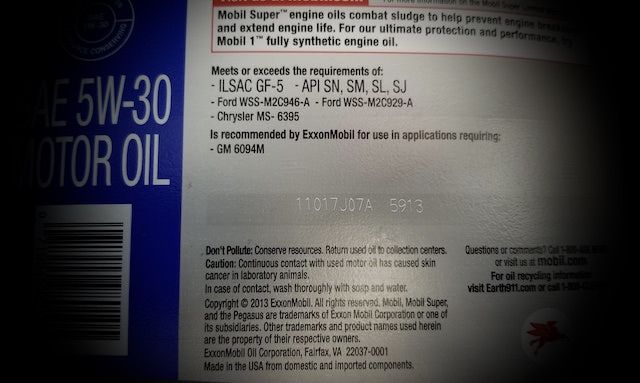Yes, motor oil does expire. Over time, the chemical composition breaks down.
This can lead to decreased lubrication and potential engine damage. Proper storage and regular replacement are important for maintaining engine health. Understanding the expiration of motor oil is crucial for vehicle maintenance and performance. Let’s explore the factors that contribute to oil expiration and how to identify if your motor oil has gone bad.
Regular oil changes are essential for optimal engine function, but determining if your oil has expired before its mileage limit is also crucial.

Credit: www.gopurepower.com
Table of Contents
The Myth Of Eternal Lubricants
Motor oil does expire, despite the common belief in eternal lubrication. Over time, motor oil degrades due to various factors. Exposure to air, moisture, and temperature fluctuations can lead to oxidation and degradation of the oil. Additionally, contaminants such as dirt and metal particles can further accelerate the degradation process. The shelf life of motor oil can also be affected by its formulation and the presence of additives. Therefore, it’s essential to consider these factors and adhere to the recommended storage guidelines for motor oil to ensure its optimal performance.
Shelf Life Of Motor Oil
It is essential to understand the shelf life of motor oil to ensure optimal performance. Unopened oil can last up to five years if stored in a cool, dry place away from sunlight and extreme temperatures. However, once opened, the oil should be used within 3-5 years. Signs of Oil Deterioration include a change in color, consistency, or the presence of any unusual odors. Additionally, expired oil may lead to engine corrosion and decreased lubrication. Regularly checking the oil’s condition is crucial for maintaining the longevity of your vehicle’s engine.
Storage Conditions Matter
The storage conditions of motor oil can have a significant impact on its lifespan. Proper storage practices are essential to ensure that the oil remains effective and does not expire prematurely.
When storing motor oil, it is important to keep it in a cool and dry place, away from direct sunlight and extreme temperatures. Exposure to heat and sunlight can cause the oil to degrade faster, reducing its effectiveness.
Additionally, it is crucial to seal the container tightly to prevent air and moisture from entering. Oxygen and moisture can lead to oxidation and contamination of the oil, which can affect its performance.
Moreover, storing motor oil in an upright position can help prevent any potential leaks or spills. It is also recommended to store the oil away from any chemicals or solvents that could potentially contaminate it.
Poor storage conditions can have a negative impact on motor oil, causing it to expire quicker and lose its lubricating properties. Therefore, it is important to follow ideal storage practices to ensure that the oil remains in good condition for longer periods.

Credit: www.reddit.com
The Role Of Additives In Oil Expiry
Motor oil contains various additives that enhance its performance and protect the engine. These additives, however, undergo a breakdown process over time, leading to the expiration of motor oil. The breakdown of additives is influenced by factors such as temperature, usage, and storage conditions.
Additives break down due to oxidation, thermal stress, and contamination. Oxidation occurs when the oil reacts with oxygen, causing it to thicken and become less effective. Thermal stress, caused by high temperatures, accelerates the breakdown of additives, reducing their efficacy. Contamination from dirt, fuel, and other particles can also degrade the additives present in motor oil.
Preserving the efficacy of additives is crucial for maintaining the performance of motor oil. Regular oil changes, proper storage, and keeping the engine clean can help prolong the life of additives and ensure optimal engine protection. It is recommended to follow the manufacturer’s guidelines and use quality motor oil to maximize the lifespan of additives and keep the engine running smoothly.
Synthetic Vs. Conventional Oil
| Oil Type | Shelf Life |
|---|---|
| Synthetic Oil | 5-7 years |
| Conventional Oil | 3-5 years |
Many car owners wonder if motor oil expires and if so, how long it lasts. The answer to this question depends on the type of oil you use in your vehicle. Synthetic oil typically has a longer shelf life compared to conventional oil. While synthetic oil can last up to 5-7 years, conventional oil generally lasts up to 3-5 years. It’s important to note that these are general estimates and the shelf life of oil can vary depending on factors such as storage conditions and the type of additives used.
When choosing the right oil for your vehicle, it’s important to consider factors such as the age of your car, the manufacturer’s recommendations, and your driving habits. If you’re unsure about which type of oil to use, consult with a trusted mechanic or refer to your car’s owner manual for guidance.
The Truth About Used Motor Oil
Motor oil does expire, but the rate at which it degrades depends on several factors. Once in use, motor oil begins to break down due to oxidation, moisture, and heat. This degradation can lead to decreased performance and protection of the engine parts. It’s recommended to change the oil every 5,000 to 7,500 miles or every six months, whichever comes first.
| Disposal and Recycling |
|---|
| Used motor oil should never be disposed of in the trash or poured down the drain. It can contaminate soil and water, causing harm to the environment and wildlife. Instead, it can be recycled at a local collection center or auto parts store. Some cities may also offer curbside pickup of used motor oil. |
Expert Insights On Oil Expiration
When it comes to motor oil, many people wonder if it has an expiration date. Mechanic recommendations vary, but most agree that oil does not necessarily expire. Instead, it can degrade over time due to factors such as exposure to air, heat, and contaminants.
Industry standards for oil change intervals suggest that it is generally recommended to change the oil every 3,000 to 5,000 miles or every 3 to 6 months, depending on the vehicle and driving conditions. However, advancements in oil technology have led to longer-lasting oils, allowing for extended change intervals.
It is important to regularly check your vehicle’s oil level and quality to ensure optimal engine performance. Signs of degraded oil include a dark color, a strong smell, and a gritty texture. If you notice any of these signs, it is advisable to change the oil, regardless of the mileage or time since the last change.
In conclusion, while motor oil does not have a specific expiration date, it is essential to follow mechanic recommendations and industry standards for oil change intervals to maintain the health of your vehicle’s engine.

Credit: www.reddit.com
Preventive Measures For Motor Oil Longevity
Motor oil, like any other substance, does have a shelf life. Over time, it can deteriorate and lose its effectiveness. To ensure the longevity of your motor oil, it is important to take preventive measures and perform periodic check-ups.
Regularly inspect the color and consistency of your motor oil. If it appears dark and dirty or has a burnt smell, it is likely time for a change. Pay attention to the mileage on your vehicle as well, as most manufacturers recommend an oil change every 3,000 to 5,000 miles.
Additionally, extreme weather conditions can also impact the lifespan of your motor oil. In hot climates, oil tends to break down faster, while cold temperatures can cause it to thicken. It is crucial to use the right viscosity oil for your specific climate.
By following these preventive measures and keeping a close eye on the condition of your motor oil, you can ensure optimal engine performance and prolong the life of your vehicle.
Frequently Asked Questions
Can I Use 10 Year Old Engine Oil?
Using 10-year-old engine oil is not recommended. It may cause damage and reduce engine performance. It’s best to use fresh oil for optimal engine function and longevity.
Is It Ok To Use Expired Motor Oil?
Using expired motor oil can cause engine damage and reduce lubrication effectiveness. It’s not recommended for optimal performance.
Does Oil Have A Shelf Life?
Yes, oil does have a shelf life. It can vary depending on the type of oil, but most oils have a shelf life of about 1-2 years. It is important to store oil in a cool, dark place to maintain its freshness and prevent it from going rancid.
Can Oil Run Out Of Date?
Yes, oil can expire and become unusable. Over time, oil can break down and lose its ability to lubricate, leading to engine damage. It’s important to check expiration dates on oil containers and replace old or unused oil to ensure optimal engine performance.
Conclusion
After researching and analyzing various sources, it can be concluded that motor oil does indeed expire. The length of time before expiration depends on various factors such as the type of oil, storage conditions, and usage. It is recommended to always check the expiration date on the oil container and dispose of any expired oil properly.
Regular oil changes and proper storage can help prolong the lifespan of motor oil. Remember, using expired oil can lead to engine damage and potentially costly repairs.
